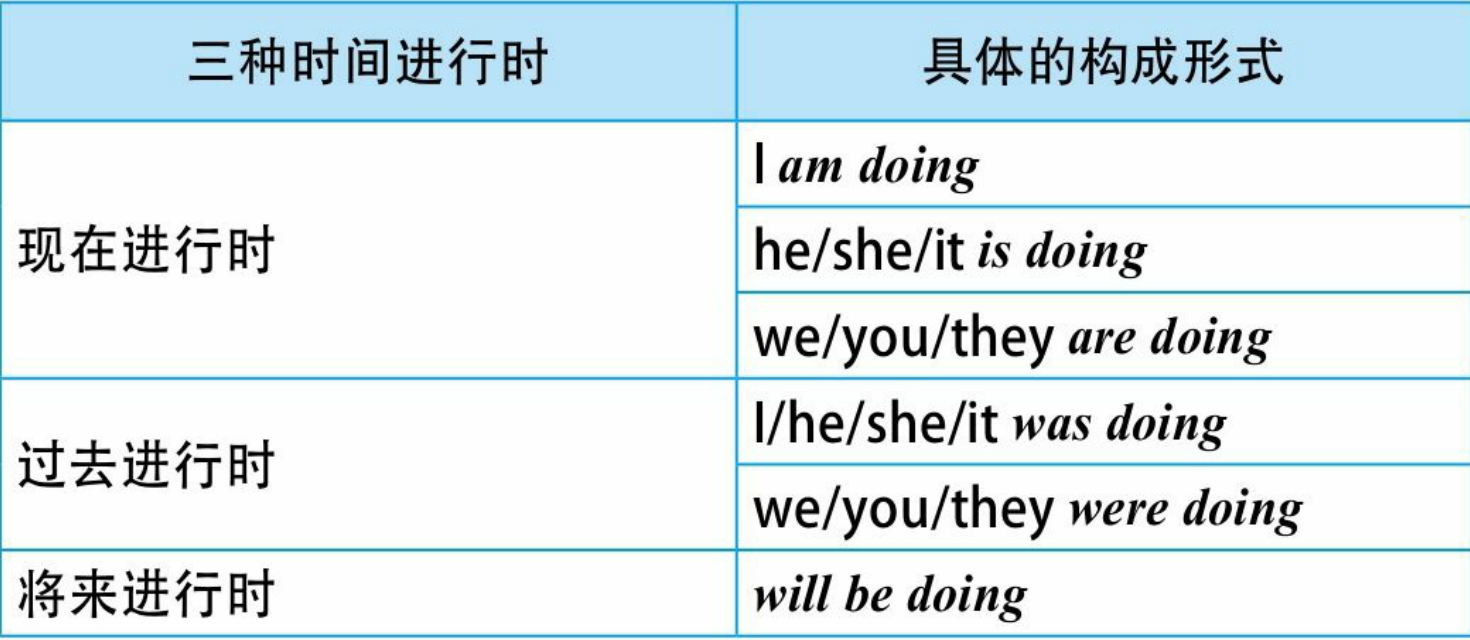这篇笔记摘选自张满胜老师的《英语语法新思维初级教程第2版》,以及其他网上知识点收集,只是我自己的个人复习笔记,禁止转载,如有侵权,请联系我删除。
引言
进行时态的构成
进行时态(continuous tense)的构成是be+doing。注意这里的be动词不是系动词,而是助动词,因而没有“是”的意思。我们可以通过对助动词be的变形来反映人称和时间的变化。
就时间的角度而言,有三种不同时间下的进行时态,即现在进行时 (the present continuous tense)、过去进行时(the past continuous tense)和将来进行时(the future continuous tense)。它们的构成分别是:am/is/are doing, was/were doing和will be doing。
将来进行时will be doing没有人称和数的变化。这里的助动词be的具体变形,既反映了时间(如动作是发生在现在、过去还是将来),同时也反映了主语人称和数的变化,但表示进行动作的doing始终不变
进行时态的意义
汉语通常采用语气助词“着”或词组“正在”等来表达。比如“他吃着饭”与“他吃了饭”,我们很容易理解前者是表示正在进行,而后者是表示完成的动作。我们还可以进一步添加具体的时间,如“他正在吃着饭”表示现在进行的动作, 而“他当时在吃着饭”表示过去进行的动作。这很像英文里的进行时态的构成和意义,比如“正在”相当于英文里表示现在时间的is,“着”相当于doing,然后结合具体动词“吃(have)”,于是便有了“He is having dinner.”这样的句子。同理,“当时在”相当于英文里表示过去时间的was,于是便有了“He was having dinner.”。
具体来说,进行时是强调在某个特定的(现在、过去或将来)时间点,某项活动正在发生。
I am watching CCTV news right now. 我现在正在看中央电视台的新闻。
I was watching CCTV news when he arrived yesterday. 他昨天到的时候,我正在看中央电视台的新闻。
I will be watching CCTV news at 7:15 pm tomorrow. 明天晚上7点15分,我将会正在看中央电视台的新闻。
直接给出具体的时间
I am listening to the English program right now. 我现在正在收听英文节目。
通过另一活动表达这一特定时刻
I will be studying English when you come tomorrow. 你明天来的时候,我将正在学习英语。
英文的进行时态be doing表达的意义远不止于“正在发生的活动”这一个意思,要比汉语的“着”所表达的意义多很多。
进行时态的使用语境
进行时态因为往往强调在说话的时刻某活动正在发生,所以常用进行时态表达生动、具体的场景。而进行时态因为其表现生动,所以在口语中出现的频率远远高于书面语。
现在进行时(不一定正在进行)
用法一:说话时刻正在进行的动作(action happening exactly now)
A: May I speak to Clint?
B: No, sorry. He is not available now. He is talking on another phone.
用法二:在目前一段时期内持续的一种暂时的情况(action happening around now)
除了上述表示的action happening exactly now外,现在进行时还常常用来表示action happening around now,也就是说表示现阶段正在持续的活动。这时进行时态表示的是一个一般性的活动,在说话时刻这个动作并不一定正在发生(通常都不在发生),而是在目前一段时期内持续的一种暂时的情况。
Jenny: Hello?
Frank: Hi, Jenny. What are you doing?
Jenny: Oh, hi, Frank. I’m doing my laundry. You?
Frank: I’m going to go look for an apartment downtown.
Jenny: Really? You aren’t content in the suburbs?
Frank: Well, this neighborhood is really booming. It’s not really a suburb any more.
Jenny: Yeah, it is getting crowded. Where are you looking for an apartment?
Frank: Probably near the train station. I’d like to use public transportation to get around.
Jenny: Hmm. I think you’ll be hard pressed to find an affordable place there.
Frank: Really? Is the area expensive?
Jenny: Yes. And I know while you’re not living in poverty, a college student still can’t afford an apartment by the train station.
Frank: Well, OK, thanks for the advice!
Jenny: You’re welcome.
上面关于“租房”的对话中:
Jenny: Yes. And I know while you’re not living in poverty, a college student still can’t afford an apartment by the train station.
这里的进行动作are not living并不是强调在说话的时刻正在做什么,而是表示目前短暂的生活情况。
朋友知道你正在找工作,关心地问你是否已经找到了:
A: Have you found a position yet?
B: I’m still checking the papers.
比如你为了赶时髦而留长发:
Long hair is really in right now. So I’m letting my hair grow.
Florence is putting away half her pay each month. Soon, she’ll be able to buy a new car.
这里的putting away显然是表示一个现阶段在持续的一般活动。
弗洛伦斯现在每月把一半的薪水存起来。我想不久她就能买辆新车了。
因为进行时态的这种用法表示目前的一种短暂的情况,所以它有时含有一种“今昔对比”之意。
I am taking the bus to work this week, because my car is in the garage.
这里的am taking the bus to work表示“坐公共汽车上班”是暂时的,只是在这个星期内的短暂活动,并且与过去“开车上班”形成了一个今昔对比。
用法三:用于表示“改变”的动词,强调“逐渐变化”的过程
这种表示action happening around now的进行时态的用法,若是用于表示“改变”的动词,则强调“逐渐变化”的过程。常见的表示“改变”的动词有:change, come, get, become, grow和deteriorate(恶化)等。
在上面租房的例子中:
Frank: Well, this neighborhood is really booming. It’s not really a suburb any more.
Jenny: Yeah, it is getting crowded.
这里的booming和getting用于进行时态显然都是表示“逐渐改变”的意思,所以分别译成“越来越繁荣”和“越来越拥挤”。
It’s getting dark. 天渐渐黑了下来。
Mom is getting old. 妈妈越来越老了。
His health is deteriorating. 他的健康状况日益恶化。
My dream is coming true. 我的梦想正一点点地成为现实。
用法四:用于强烈的感情色彩的表达
Harry: Fine. Fine, but let’s just get one thing straight. I did not go over there that night to make love to you, that is not why I went there. But you looked up at me with these big weepy eyes, “Don’t go home tonight, Harry, hold me a little longer, Harry.” What was I supposed to do?
Sally: What are you saying? You took pity on me?
Harry: No, I was… (Sally slaps Harry whole-heartedly, then storms out of the kitchen.)
这里的进行时态are…saying也并不是强调正在进行的动作,而是为了表达萨莉强烈的愤怒的感情——萨莉觉得自己被侮辱了,以至于第一次把哈里扇去了“五指山”!
Marie: He was shaving and there it was in his briefcase.
Sally: What if he came out and saw you looking through his briefcase?
Marie: You’re missing the point, I’m telling you what I found. He just spent a hundred and twenty dollars on a new night gown for his wife. I don’t think he’s ever going to leave her.
Sally: No one thinks he’s ever going to leave her.
Marie: You’re right, you’re right, I know you’re right.
这里的进行时态are missing和am telling同样不是为了说明 正在发生的动作,而是为了表达感情色彩。因为前面萨莉说:“他当时要是出来了看到你在翻他的公文包可怎么办啊?”这显然不是玛丽所关心的,所以她用进行时态强调说“You’re missing the point, I’m telling you what I found.”。
我们生气时可以这么说:
I’m not having this conversation with you.
这句话相当于说“I don’t want to talk to you about this.”。
我不跟你说了。
You are asking too much! 你的要求太过分了!
用法五:表示将来确定的安排
现在进行时在口语中还经常用来表示将来的动作(action in the future),此时现在进行时是表示在说话之前就确定的、计划好的将来的安排。
在我们用现在进行时态来谈将来确定的安排的时候,如果没有明确的上下文语境来表明将来时间的话,我们往往需要加上明确的表示将来时间的状语,如tomorrow, next year, in June和at Christmas等,以避免与正在进行的动作混淆。
We’re eating in a restaurant.
这句话往往会被理解成正在发生的动作——“我们现在正在餐馆吃饭”。如果我们给出将来的时间状语,比如tonight,说成“We’re eating in a restaurant tonight. We’ve already booked the table.”(我们今晚要在餐馆吃饭,我们已经订了位置。)
A: What are you doing on Saturday night?
B: I’m doing some shopping with Jane.
be going to表示将来打算的用法。be doing和be going to do都可以表示将来的计划,它们有何区别呢?
主要的区别是:
现在进行时强调事先已经做好的安排,是比较确定要发生的;而be going to着重表现说话者的计划和意图,并不是确定的安排。
Frank and Jenny are getting married? I didn’t even know they were going together.
弗兰克和珍妮要结婚了?我连他们俩在谈恋爱都不知道。 这里的进行时态are getting married表明结婚日期已确定。如果说: Frank and Jenny are going to get married. 则表示他们两人打算结婚,并没有确定将来具体的日期。
1) I’m staying at Beijing. 2) I’m going to stay at Beijing.
1) 我会待在北京。 2) 我打算待在北京。
再者,对于静态的动词和无生命的主语,不可能使用现在进行时来表示将来。但可以用于be going to,这时表示预测。如不能把belong to 用于进行时态,说成:
The red car is belonging to me tomorrow. *
但belong to可以用于be going to结构,说成:
The red car is going to belong to me tomorrow.
这里是表示预测。 明天这辆红色的汽车就将属于我了。
不能说:The tree is falling tomorrow. * 但可以用be going to表示将来的预测,说成:
The tree is going to fall tomorrow. 这棵树明天就会倒下了。
当然,若是没有计划或安排可以保证相应的结果会出现,也不能使用现在进行时:
We are winning the tennis match next weekend. *
因为能否赢得比赛事先无法确定。但我们可以用be going to来表示预测,因而可以说成:
We are going to win the tennis match next weekend.
这里的be going to表示推测,该句的意思是:我们下周会赢得那场网球比赛的。 这句话还可以解释成:be going to表达“决心”,因此可以理解成: 我们下周一定要赢得那场网球比赛。
用法六:与always等连用,表示多次重复,且含有感情色彩
现在进行时的感情色彩的表达,还有另外一种用法,就是常与 always, forever, continually和constantly等连用,表示多次重复的行为。 这种反复的行为可以是积极的、让人喜欢的事情。
Scott is very generous. He’s always giving his friends gifts and inviting them out for meals. 斯科特为人十分慷慨大方,他总是会送朋友礼物,并请他们吃饭。
但也往往表示让说话者厌烦、感觉不合情理或使人不愉快的事,即通常具有负面的、消极的含义。
He’s always pulling my leg. 他总是开我的玩笑。
He’s continually asking me for money. 他总是向我要钱。